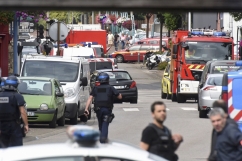
Father Jacques Hamel, 84, was celebrating Mass with two nuns and two other worshippers inside the church in Saint-Étienne-du-Rouvray, near Rouen in northern France when they came under attack.
Local people paid tribute to a "good" and humble priest who never courted attention.
A woman who worshipped at the church described Hamel as "a man who did his job to the end". She added: "He was elderly but was always available for whoever. He was a good priest. He has been here for a long time and many parishioners knew him well."
Father John Hogan, OCDS, a Secular Discalced Carmelite priest, tweeted that Hamel was "a good priest...discreet. He was quiet, didn't like attention...He assumed his duties to the end. He was well-liked. It seems he was a simple, faithful priest, quietly serving God and his people."
A woman who works at a local beauty parlour, Eulalie Garcia, echoed the tributes to the self-effacing priest.
"My family has lived here for 35 years and we have always known him," Garcia told local reporters.
"He was someone who was treasured by the community. He was very discreet and didn't like to draw attention to himself."
Hamel, who had been retired for nearly a decade, had lived in northern France all his life having been born there in 1930.
Ordained in 1958, Hamel spent more than 30 years at St-Étienne, and celebrated 50 years in the clergy in 2008.
He continued to officiate regularly as auxiliary at the church in St Étienne-du-Rouvray as well as in neighbouring Elbeuf, stepping in for the parish's regular priest, Father Auguste Moanda-Phuati, when the latter was unavailable.
According to the Archdiocese of Rouen, Hamel requested after officially retiring at 75 that he remain in the parish and continue to help when necessary. "This man was a good man," said the president of the regional council, Hervé Morin.
Writing on Twitter, Morin described the killing as a tragedy that has hit Normandy, France and the Catholic Church.
Hamel lived in the rectory at the modernised church and commune, which lies on the site of Gallo-Roman settlements dating back to 200-300 AD.
In 1790, during the French Revolution, Saint-Étienne-du-Rouvray was constituted as a political administration. The town became urbanised from the mid-nineteenth century with the arrival of railway and the industrial revolution.
The first steam trains run by the Western Railway Company between Paris and Rouen began service in 1843. Then in the 1860s a major cotton factory was built, creating hundreds of jobs.
In 1923, Saint-Étienne-du-Rouvray became one of the first cities in France to be majority communist. Now it is a quiet town.
Moanda-Phuati told Libération: "I could not possibly imagine anything like this happening (here). We have never received any threats."














